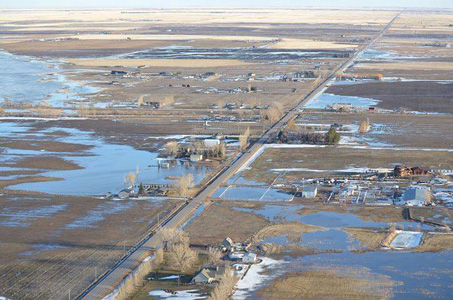Current Temperature
12.8°C
TID prepares for season with delayed seeding
Posted on May 2, 2018 by Taber Times TIMES FILE PHOTO
TIMES FILE PHOTOBy Tim Kalinowski
Alta Newspaper Group – Lethbridge
While in the short term overland flooding in local districts is a threat to infrastructure and property, for farmers the recent flooding means losing a good portion of their spring seeding season.
On a more positive note, irrigated acres are substantially easier to drain, says Taber Irrigation District manager Chris Gallagher, but the irrigation season will definitely be delayed as TID works to clear out ice-choked canals.
“We have not yet set a start-up date,” confirmed Gallagher. “That means farmers have got lots of water on their land, and it’s going to be a delayed start-up (for seeding). We do understand there are some crops that do need early water, especially sugar beets and canola, and we know there is going to be some demand to have water sooner. But we are indicating to them we expect to be delayed this year, and to expect that seeding will need to be delayed also. They should be checking with us to confirm start-up dates for water supply before they seed.”
TID has obtained permission to allow its members to pump out standing water in their irrigated acres once canal flows return to stable and manageable levels.
“Our major focus is getting free-flow to the river so we can safely match our (rising) reservoir levels,” Gallagher states. “The next step then is to address our farmers who have ponded water on their fields. We have obtained a blanket approval from Alberta Environment so that any TID member on our assessment rolls can obtain written permission from us to start pumping across their (irrigated) fields into our works. We are looking at maybe a week from now we will be able to start pumping out those fields where needed. We can’t start pumping out those fields until we are sure our canals can handle it.”
Gallagher says it has been a challenging spring for all local irrigation districts, but he hopes the flood concerns will soon recede and their farmers can get back into their fields before too long.
“For our district we are now kind of out of the woods for inflow unless the forecast changes. The vast majority of the snow that was on the land has melted. The ground is still saturated, however, so sometimes we do find some diurnal cycles where when the temperature gets up during the day the water starts to seep out of the soil and then into our canal systems. But we are not finding the surges we had previously.”
“However,” he cautions, “we know our neighbours to the east and to the north are still having some issues (in Vauxhall and Bow River Irrigation District). We are working with them to take some of their water into our Horsefly reservoir to relieve some of the pressure as that water moves east.”
Leave a Reply
You must be logged in to post a comment.

